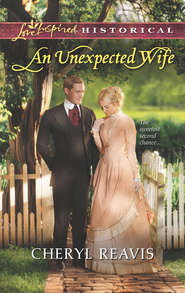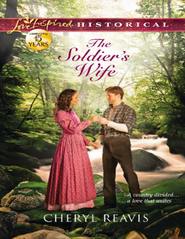По всем вопросам обращайтесь на: info@litportal.ru
(©) 2003-2024.
✖
The Bride Fair
Настройки чтения
Размер шрифта
Высота строк
Поля
She got up from her chair and hurriedly left the table, disappearing through the doorway into the kitchen.
Max looked at her father, but the old man clearly felt no need to explain her behavior—possibly because he couldn’t. Perkins suddenly appeared in the dining-room doorway, looking as if he didn’t quite know how he’d gotten there.
“Did you speak to Miss Markham just now?” Max asked him, because he thought it the only explanation for the man’s perplexed look.
“Yes, Sir. Very briefly. I believe the colonel needs coffee?”
The colonel didn’t, but Perkins picked up the coffeepot and poured as much as he could into the already full cup anyway.
“Anything else, Sir?” he asked.
“Stay handy,” Max said. “When Mr. Markham is done, you can clear the table. Then you can bring me my leather case. I have reading I need to do.”
Mr. Markham cleared his throat. “My daughter is sometimes very…high-strung. The war was hard on the women here.”
“The war was hard on the women everywhere,” Max said, thinking of the unmarked burial trenches and the women who perhaps still waited to hear what had become of their men.
He took a small breath and tried to let go of the animosity that threatened to overwhelm him. The war was over.
Over.
He had managed to get past the bitterness he harbored after John Howe made his solo escape from the prison. If he could put that behind him, surely he could let go of the rancor he felt for the people in this town who had, perhaps unknowingly, tolerated the mistreatment of Union prisoners.
When the old man had taken his leave and Perkins had gone to fetch the leather case, Max kept watching the door that led to the kitchen.
But there was no sign of Maria Markham.
Chapter Four
Maria heard her father slowly climb the stairs and shuffle out onto the second-story porch. He would stay there, reading, until it became too sunny for his comfort. She had a little time before he came inside again.
She heard the front door open and close—twice. The house had gone very quiet. Colonel Woodard and his sergeant major must have left for military headquarters. He would have a great deal to do his first real day in command. Perhaps he would be as late returning as he was last night.
That prospect cheered her considerably. She gave a quiet sigh and wiped her face again with a wet cloth. She was feeling better—less indisposed, at any rate. She wouldn’t have to make any kind of explanation to the colonel, but what was she going to tell her father? He couldn’t abide rudeness in his children—even if it seemed to be directed at a Yankee invader. And she couldn’t explain that she hadn’t been rude at all. She couldn’t tell him that what he mistook for impoliteness was actually the sudden and overwhelming nausea of pregnancy.
She forced herself to stand up. She couldn’t hide forever, and she had a great deal of work to do. She came quietly down the back stairs into the kitchen. The dishes had all been washed and dried and placed in neat stacks on the worktable. Had she been gone that long?
She looked around impatiently for the leftovers—food she planned to somehow circumvent the curfew and take to Suzanne Canfield. Phelan had said Suzanne was worse today; there was no way she could get anything to eat on her own. And the little boys. Who would feed them? Phelan intended to get back home through the woods—if he could keep out of the sight of the army patrols—but she had no way of knowing if he’d made it. Even if he had, he wasn’t all that reliable when it came to caring for his wife and children. Suzanne had no family here to help her, and neither did Phelan.
She kept looking around the kitchen, but she couldn’t find a single cold biscuit. No pieces of ham. No bacon. Nothing.
She walked into the dining room, thinking that perhaps the bread basket had been left on the table. Colonel Woodard was still sitting exactly where she’d left him, only now he was reading a letter. He barely looked up.
“I’ve been waiting for you,” he said when she tried to back out of the room.
She hesitated, trying to think of a way to escape. Nothing came to mind.
“What is it, Colonel?” she asked from the doorway, hoping that he only wanted something fetched or carried rather than her continued presence.
“Sit,” he said.
After a long moment she did so—she still needed the money. There was a pitcher of water and a small glass on the table, and a plate with a lemon and a knife on it—none of which she had provided.
“If you would cut the lemon,” he said, “and squeeze some of the juice into a glass of water, please.”
Please.
He didn’t toss that word around much, and she regarded him warily.
There was nothing to do but oblige. The sooner she did as he wanted, the sooner she could go.
She filled the glass, cut the lemon, picked out the seeds and squeezed in the juice, wondering all the while how much a piece of fruit this fine would cost. When she’d finished, she started to push the glass toward him.
“No,” he said. “Drink it. It’s for you.”
“I don’t need—”
“Yes, you do. It will make you feel better if you sip it slowly.”
“You practice medicine as well as head the military government?”
“I want you healthy, Miss Markham. Of course, you don’t have to follow my recommendation. We can have the army surgeon look at you—just to make sure you are not coming down with some illness which might be an…inconvenience.”
“Inconvenience to whom?”
“To me,” he said easily. “I suspect, though, that you are not ailing. I suspect you are experiencing a mild upset this morning—brought on by a late night and by the worry of having unwelcome strangers in your house—not to mention the concern you must have for your father’s health. In which case, fresh lemon juice in water will alleviate it. Please. Drink it.”
She looked at him across the table. He was studying her closely—too closely—but not in the lecherous way Hatcher had. She would have to be careful with this man. He meant what he said about understanding the people here, and he would not miss much that went on around him, regardless of his arrogance. She glanced at his injured hands, and he saw her do it.
“Yes,” he said. “I’m merely returning the favor.”
She waited as long as she dared, then took a small sip of the lemon water. It was…refreshing, and not an affront to her queasy stomach at all. She took another sip, and then another.
“Thank you,” she said, her voice low.
“You are welcome, Miss Markham. Tell me about your brothers.”
“What?” she said, startled.
“Your brothers,” he repeated.
She was so caught off guard that she still didn’t say anything.
“They were killed in the war,” he said. It wasn’t quite a question.
“Yes,” she said.
“How old were they?”











